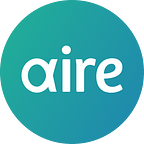Adi Mukherjee has been a member of Aire’s full-stack Software Engineering team since July, 2018. Here’s a quick snapshot on his work, and life beyond.
1. Coffee count so far today (17:33)
☕️ ☕️ ☕️/ daily average ☕️ ☕️ ☕️
Aire-time
2. What’s been your biggest accomplishment since becoming an engineer at Aire?
Designing a solution for a backwards-incompatible upgrade to our infrastructure.
I really enjoy “solution design” style work and wanted to do this because it was an interesting problem.
It was a challenge to design and propose a solution for a system I had only just started getting to know. Furthermore, I needed to showcase my ideas and come up with a recommendation for review by people who are much more experienced than me!
In the end, I applied my existing knowledge, asked lots of questions of my Scrum team that supportingly shadowed me every step of the way, and I documented everything I could think of.
The review went well, my recommendation was accepted, and deployed it into production a few weeks later!
3. What uncomfortable forest* are you glad to have taken a walk in since arriving at Aire?
* At Aire, we’re not afraid to take the hard path. Even if it takes more time or creates more pain. We want to ensure we do it the right way.
Questioning existing processes. As a new starter, it’s normal to feel one hasn’t been around long enough to start questioning established ways of working, especially if they appear to have high levels of buy-in. But only on trying to explore the history and rationale for processes do you uncover the hidden thoughts of others and potentially encounter a surprising amount of common ground!
4. What are you most looking forward to getting your teeth stuck into next at Aire?
Bolstering our core product in production, specifically any performance related work.
5. What do you think the biggest change to the engineering team has been in the last month?
Pairing our digital workflow board with a physical one. Although old school, there’s something very satisfying about moving Post-its around a real space. It’s a great starting point for conversations.
Downtime
6. How do you stay up-to-date and keep your skills sharp?
Reading, testing, playing. The latter two are especially important as I find it all too easy to go down a rabbit hole of what seems like focused reading. But I’m terrible at retaining information until I have a chance to use it in some way.
A good way to learn a new language or framework is to have a clear idea in mind of a project that can/should be done using it, and then building a version 0.1 of it.
7. What are you learning right now?
- Infrastructure automation and management: Kubernetes, Terraform
- Programming languages: Rust
- Other: hand balancing
8. What’s been your favourite conference experience?
I’ve only been to one — Devoxx. It was pretty good!
9. What’s the one conference you’d like to go to but haven’t been to yet?
Coed:Ethic — Ethics in our industry is something that people can find easy to avoid, but software is eating the world. I think we need to think beyond the technical aspects of our craft to the very real and widespread impact of the systems we build. I heard about this conference from a great talk So You Can Sleep At Night — ethics in software engineering, with Jonathan Rothwell & Steve Freeman.
10. What’s the podcasts/ blog/ book you swear by?
Podcasts:
- Freakonomics Radio — I’m a huge fan of behavioural economics; it’s fascinating and useful. This show consistently blows my mind with counterintuitive ideas.
- 99% Invisible — Design is a foundational pillar of software engineering. This show, while not specifically software related, has interesting short stories about the origins of everyday objects.
- Hardcore History — I have learnt more about history from this podcast than high school. Dan Carlin tell history as a story. It holds my personal record for continuous engagement — 9 hours in one weekend (Blueprint for Armageddon; series of episodes about WW1). It’s long-form, but I cannot recommend it enough.
Blog:
- Whatever is on Hacker News.
Books:
- Thinking Fast & Slow, Daniel Kahneman — I think of this book as the bug tracker for the human brain. It is a fascinating read detailing results of decades of behavioural research, in an accessible and interesting way. Remembering and applying even 10% of its contents would yield amazing results.
- Meditations, Marcus Aurelius — A timeless classic and must read for anyone interested in stoicism. I find it interesting how life lessons from people who lived over 2000 years ago still apply today.
- After On, Rob Reid — a fun and astute look to the future of tech. and humanity. It covers domains such as AI, synthetic biology, geopolitics, and the tech. industry. In fact, I really recommend the audiobook; the production quality and voice acting is excellent. Highly entertaining and doesn’t take itself too seriously whilst going over a lot of deep stuff.
11. Any personal projects outside of work?
A few — the most promising is a tool to link all my contacts across the various mediums e.g. WhatsApp, email, SMS so I spend less time switching apps to message people!
